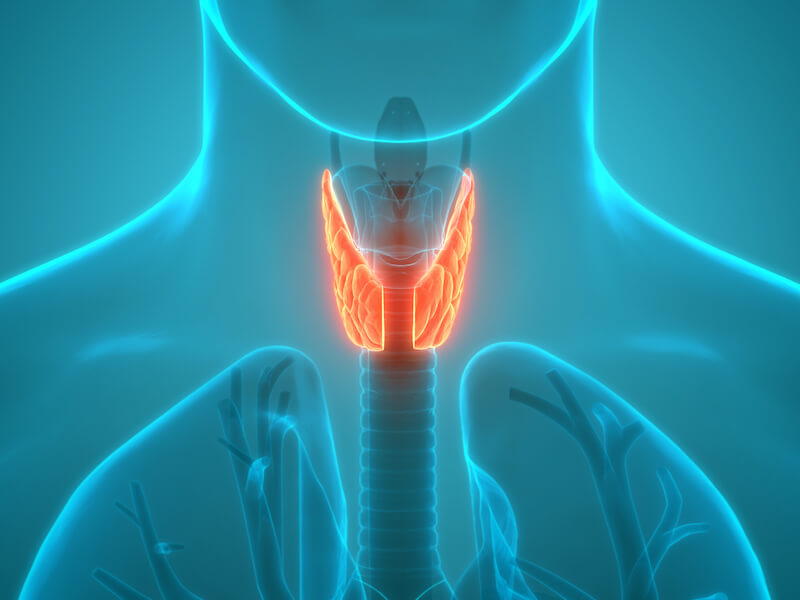
It may be your thyroid
You’ve heard that before. Your best friend has some experience with thyroid problems and suggested over dinner that you may be coping with a similar issue.
It turns out thyroid conditions are fairly common. In fact, some approximations suggest that somewhere around 200 million individuals worldwide suffer from thyroid problems.
So… maybe it is your thyroid!
Understand your thyroid
Knowing what your thyroid does and how it usually works is important in order to really appreciate what causes it to have problems.
Inside of your neck, just below your larynx, sits a butterfly shaped gland called the thyroid. Usually, you will never even detect that it’s there, it isn’t something you can see or feel (at least, not when your thyroid is healthy).
Your thyroid is responsible for breaking down iodine from your food, producing crucial hormones that help your body function and regulate your metabolism. That makes your thyroid pretty indispensable, even if you don’t really notice it’s there.
Your thyroid can cause problems in two fundamental ways. Either your thyroid can be too active or not active enough, in either case, you’ll begin to notice symptoms.
When your thyroid goes into overdrive
A thyroid that’s too active causes a condition called hyperthyroidism. Too many hormones that help regulate your metabolism are produced when this condition happens. The rhythm of your body increases. And, look, that may sound like a good thing (you may assume it means you can eat like a teenager again), but this increased metabolism can trigger all kinds of issues, like excessive sweating, accelerated heartbeat, sudden weight loss, irritability, and more. Your thyroid can even become enlarged.
A large number of problems, from Graves’ Disease to hyperthyroiditis, can cause an enlarged thyroid. In some cases, it’s genetic or hereditary. But it’s more prevalent in women and people who deal with chronic illness.
Here are a few treatments for an overactive thyroid.:
- Thionamides
- Beta-blockers,
- Radioactive iodine treatment
You likely won’t begin feeling better with these treatment options for a couple of months.
When your thyroid falls behind
An underactive thyroid, conversely, is called hypothyroidism. This means a slower metabolism. Weight gain (or the inability to lose weight even with exercise and a healthy diet), hair loss, sluggishness, or brittle nails are all normal symptoms of this condition. A general feeling of exhaustion can also happen.
Here are the causes of hypothyroidism:
- Pregnancy
- Pituitary disorders
- Congenital disease
- Iodine deficiency
Synthetic hormones are typically involved in these treatments. Once you start taking these hormones, you’ll normally begin feeling better.
How can you tell when your thyroid is hyper-or-under active?
It can be tricky to diagnose a thyroid condition. They can frequently act like other conditions. So if you had a thyroid issue, how would you know? Watch out for these 6 symptoms, and schedule an appointment with us if you notice them.
- Difficulty swallowing: There’s only so much space inside of your neck! A hyperactive thyroid has a tendency to grow. So you will probably have difficulty swallowing if your thyroid is growing. That’s because your esophagus might be getting crowded out by your thyroid.
- Sleep issues: Hyperthyroid issues can make it difficult to fall asleep at night, you’ve got too much energy to lay still! Hypothyroidism can make it difficult to get up in the morning, you don’t have the energy to wake up! A thyroid problem could be to blame if you’re noticing either of these.
- Weight changes: Weight changes can occur from both hyperthyroidism and hypothyroidism. You’ll unexpectedly lose weight when your thyroid is hyperactive. That weight will be hard to shed when your thyroid is underactive. It’s not always a good or bad thing to have a weight change, but it can be a little unnerving if you don’t have any control over your weight.
- Enlarged neck: Naturally, in some situations, your neck makes room. You may discover a lump growing on your neck in these situations. This type of growth is called a goiter. And that goiter can be a sign of an enlarged thyroid. If you detect this, you should talk to us as soon as you can.
- Heart rate changes: Most individuals think of “metabolism changes” in terms of weight gain or weight loss, but the rate at which your body turns food into energy (the broad definition of metabolism) can have physical impacts. When your thyroid forces your metabolism to speed up or slow down, for example, abrupt changes in your heart rate can occur.
- Brain Fog: When your body isn’t generating or utilizing energy effectively, your nervous system slows. Even your ability to think with clarity can become sluggish. Most doctors call this “brain fog,” and it can be a significant symptom of thyroid issues.
It’s not hard for doctors to treat thyroid issues
You want your thyroid gland to work as normally as possible. That way your body gets the hormones it requires to control its metabolism by eliminating iodine. But if something’s wrong, we will likely be able to help you find a solution. The majority of thyroid conditions can be controlled and treated, meaning you’ll quickly see relief of your symptoms.
Make an appointment for a consultation today.